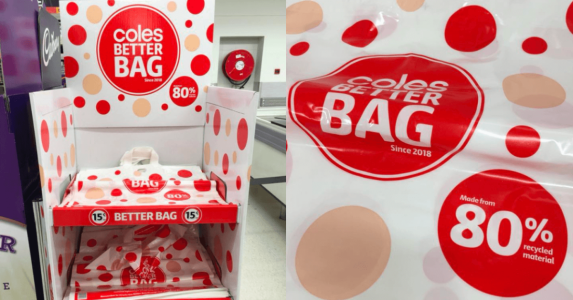Coles goes green: Soft-plastic shopping bags to be completely phased out by the end of June
- Replies 18
Big news on the grocery shopping front! The supermarket giant Coles is making a bold move towards eco-friendliness, as they announced that they're finally giving soft-plastic bags the boot, both in-store and online, by the end of next month.
This means that Coles will stop selling soft-plastic bags by the end of June. They'll be using up their remaining supply, and then it's bye-bye to those plastic bags for good!
Next time you head out for your weekly grocery run, you might want to keep this in mind. This initiative is expected to make a massive difference, taking 230 million plastic bags out of circulation within a year.

Now, we can hear your thoughts buzzing: ''What can we use instead?'' Good question! Coles Group's Chief Operations and Sustainability Officer, Matt Swindells, has got us covered.
He suggests that the most sustainable option is bringing your reusable bag when heading to the supermarket. But don't worry; we've all had those moments where we forget our trusty green bags.
In those cases, Coles will still have options for us. If you forget your reusable bag, you can grab a paper bag for just 25 cents. These bags have been tested to hold up to 6kg so that you can pack your groceries without any worries.
But if you're looking for a more durable and sustainable option, Coles has got that covered too. They have a range of reusable bags available for purchase, starting at just $1. And for those big grocery hauls, they have larger size options for $2.50. From next week, these bags will also be available for home delivery and Click&Collect orders.
This transition towards phasing out soft-plastic shopping bags is not their first eco-success. Back in 2018, they removed single-use plastic carry bags at checkouts, which was a huge success. This initiative alone saved an estimated 14,000 tonnes of plastic from annual production.
It's great to see such a big player in the supermarket industry taking responsibility for their impact on the environment. We can all do our part by supporting their initiatives and making small changes in our daily lives. Every little bit counts!

In related news, a recent development with Coles and Woolworths has addressed a stockpiling issue with soft plastic waste. This waste was accumulated by the now-collapsed company REDcycle.
The NSW Environment Protection Authority has set deadlines for both supermarket chains to dispose of the soft plastic waste found at numerous sites across the country.
The issue is widespread, with nineteen sites in New South Wales, fifteen in Victoria, six in South Australia, two in Tasmania, one in Queensland, and one in Western Australia, all containing stockpiles of plastic waste.
REDcycle's soft plastic recycling program ended last year after it was discovered that soft plastic that consumers returned to supermarkets for recycling was instead put into storage.

It's important for companies to take responsibility for their waste, and it's great to see these supermarket giants stepping up to the plate. Hopefully, this will lead to more stringent measures in the future to ensure that waste is managed responsibly and doesn't harm the environment.
What are your thoughts on Coles' decision to officially stop selling plastic bags? Do you think other supermarkets should follow their lead? Are there any other sustainability initiatives you'd like to see supermarkets take on in the future? Let us know in the comments!
This means that Coles will stop selling soft-plastic bags by the end of June. They'll be using up their remaining supply, and then it's bye-bye to those plastic bags for good!
Next time you head out for your weekly grocery run, you might want to keep this in mind. This initiative is expected to make a massive difference, taking 230 million plastic bags out of circulation within a year.

Coles has promised to phase out soft-plastic shopping bags in-store and online by the end of June. Credit: Facebook.
Now, we can hear your thoughts buzzing: ''What can we use instead?'' Good question! Coles Group's Chief Operations and Sustainability Officer, Matt Swindells, has got us covered.
He suggests that the most sustainable option is bringing your reusable bag when heading to the supermarket. But don't worry; we've all had those moments where we forget our trusty green bags.
In those cases, Coles will still have options for us. If you forget your reusable bag, you can grab a paper bag for just 25 cents. These bags have been tested to hold up to 6kg so that you can pack your groceries without any worries.
But if you're looking for a more durable and sustainable option, Coles has got that covered too. They have a range of reusable bags available for purchase, starting at just $1. And for those big grocery hauls, they have larger size options for $2.50. From next week, these bags will also be available for home delivery and Click&Collect orders.
This transition towards phasing out soft-plastic shopping bags is not their first eco-success. Back in 2018, they removed single-use plastic carry bags at checkouts, which was a huge success. This initiative alone saved an estimated 14,000 tonnes of plastic from annual production.
It's great to see such a big player in the supermarket industry taking responsibility for their impact on the environment. We can all do our part by supporting their initiatives and making small changes in our daily lives. Every little bit counts!
Key Takeaways
- Supermarket giant Coles has announced that it will stop selling reusable plastic bags in-store and online by the end of June 2023.
- The supermarket's remaining supply of plastic bags will be used up before ceasing to sell them all together.
- The move is expected to take 230 million plastic bags out of circulation nationwide within a year, and Coles will continue to sell 100% recycled paper bags and reusable tote bags as alternatives.
In related news, a recent development with Coles and Woolworths has addressed a stockpiling issue with soft plastic waste. This waste was accumulated by the now-collapsed company REDcycle.
The NSW Environment Protection Authority has set deadlines for both supermarket chains to dispose of the soft plastic waste found at numerous sites across the country.
The issue is widespread, with nineteen sites in New South Wales, fifteen in Victoria, six in South Australia, two in Tasmania, one in Queensland, and one in Western Australia, all containing stockpiles of plastic waste.
REDcycle's soft plastic recycling program ended last year after it was discovered that soft plastic that consumers returned to supermarkets for recycling was instead put into storage.

Woolworths and Coles took control of REDcycle's stockpiles shortly before the company filed for voluntary administration. Credit: Coles, Woolworths.
It's important for companies to take responsibility for their waste, and it's great to see these supermarket giants stepping up to the plate. Hopefully, this will lead to more stringent measures in the future to ensure that waste is managed responsibly and doesn't harm the environment.
What are your thoughts on Coles' decision to officially stop selling plastic bags? Do you think other supermarkets should follow their lead? Are there any other sustainability initiatives you'd like to see supermarkets take on in the future? Let us know in the comments!







